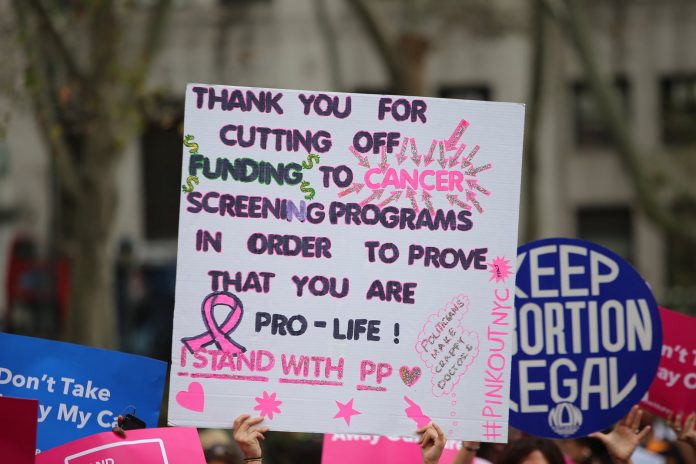Since election night, women across the country have been focused on what to do to protect their reproductive health rights—from affordable birth control to free mammograms—after Trump took office. But now, just days into the new year and a week before inauguration, a newly convened Senate is reminding us that the president-elect is not the only one looking to erode years of progress and protections around women’s bodies and health. Here, three new developments that are scary, but have not yet been passed into law (meaning there is still time to call your representatives, sign petitions and fight back).
Renewed attacks against Planned Parenthood. Conservative Republicans have made no secret of their desire to gut federal funding to Planned Parenthood because the organization provides abortions. And though he waffled quite a bit during the campaign, Trump also ultimately pledged to de-fund it—though he admitted that PP has saved millions of lives by providing mammograms and other critical preventative treatments for women. Last week, Speaker of the House Paul Ryan confirmed that within the bill to repeal Obamacare—a bill that could be voted on in the next month—there is a provision to defund Planned Parenthood.
If the bill passes and becomes a law, Planned Parenthood stands to lose approximately 40 percent of its funding. This translates to roughly 2.5 million women losing access to care annually. Most of the federal money that Planned Parenthood receives is used for preventive health care, birth control and pregnancy tests.
In 2015, a bill passed that included a provision to defund the organization. What saved Planned Parenthood’s funding? A veto from Obama. Since that is no longer an option, the Democrats are organizing to get enough votes to block passage. Last Week, House Minority Leader Nancy Pelosi said, “So I just would like to speak individually to women across America: This is about respect for you, for your judgment about your personal decisions in terms of your reproductive needs, the size and timing of your family or the rest, not to be determined by the insurance company or by the Republican ideological right-wing caucus in the House of Representatives.”
Here’s what you can do to help: Head to Planned Parenthood’s website and sign up on the I Stand With Planned Parenthood page to receive emails and other action items.
Sexual assaults on college campuses may be harder to prove. On campuses throughout the nation, it is already difficult for female students to prove sexual assault—and if Republican representative Mark Meadows gets his way, it could become even harder. He sent a letter in December asking Trump to repeal the 2011 Dear Colleague Letter, which was drafted by the Department of Education and gives federal guidelines for handling campus assaults.
Meadows believes the guidelines are not effective, yet has not offered an alternative. Last week, two Democratic senators, Patty Murray and Bob Casey, sent Trump a letter asking him to maintain the rules, writing, “Campus sexual assault is a widespread problem affecting millions of college students across the nation, and institutions of higher education have struggled to respond even with the best of intentions.”
The Senate HELP Committee has to vote to accept Trump’s nomination for secretary of the Department of Education, Betsy DeVos. Contact the members and let them know you support the Dear Colleague Letter.
Health-care providers in Texas can deny treatment to women who have had abortions and to transgender people. Common sense tells you that if a sick person goes to the doctor needing medical care, then they should receive it. The law also tells us this: One section of the Affordable Care Act says all are entitled to treatment. But before Republicans can repeal the act, one Texas judge has thrown out the provision about all people getting treatment in his state. Last week, U.S. District Judge Reed O’Connor ruled that if a medical provider believes someone’s lifestyle or decisions (including past decisions) goes against their religious beliefs, they can deny service. So, for example, if a doctor’s religion says being transgender is wrong, he or she can refuse a patient who is. Arguably, this could extend not just to abortion, but homosexuality and other religions.
It is a dangerous legislative hole to go down, one that literally could result in sickness and death.
From Hello Beautiful
The Frightening Attacks Against Reproductive Health in 2017






